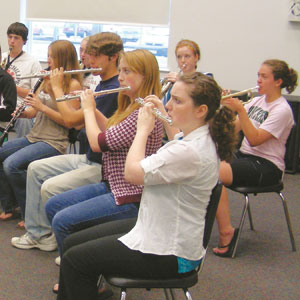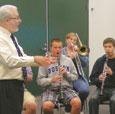Band and orchestra directors who are new to teaching tend to make the same mistakes – missteps – with their ensembles. Nothing is worse than seeing talented, caring young professionals stumble. Over the years I have helped many new teachers understand their errors and put them back on the path of effective instruction.

Misstep #1. Choosing music that is too difficult or of poor quality.
College graduates arrive at their first teaching job having been part of high-level music school programs with outstanding wind ensembles and symphony orchestras. Their ears are full of great music – monuments of the literature – as they suddenly find themselves planning for a sixth-grade band or orchestra program.
Many of these teachers easily overestimate students’ abilities and select music beyond their capabilities. When music is too difficult for a group, instructors tend to teach by rote and gloss over the mastery of basic skills. At the same time they neglect opportunities to develop expressive playing in students. This is the most common mistake for new teachers.
New directors should have an intimate knowledge of a broad range of high-quality literature of artistic merit at all levels, including very easy and easy music. This means knowing these pieces by name, composer, and level in addition to studying them in detail and listening to recordings of the music with a score.
While a director may have been hired because of his expertise playing the Holst Suites or the Rossini Overtures, the key to his position is developing a strong music program by being able to select good-quality music that challenges a variety of students without discouraging those who have only modest skills.
Directors whose ears are filled with difficult literature need to know what high-quality music sounds like and looks like at all levels. I suggest you prepare a literature database of representative pieces to develop a healthy knowledge of what is available and good for students at various skill levels. You can then build a multi-year, sequential program of music study instead of just performing individual pieces.
Be careful when reviewing state music lists for repertoire because they are not all alike. Be sure to look for graded literature for all levels that is selected by specialists and updated regularly.
Some reliable resources for good-quality literature include the New York State School Music Association Manual (www.nyssma.org), the Wisconsin School Music Association Festival Music List (www.wsmamusic.org), and the Texas Music Educators Association (www.utexas.edu), which includes the University of Texas Interscholastic League’s prescribed music lists.
Misstep #2. Having unrealistic expectations about how much each student knows.
It is easy to forget the commitment it took to learn to play an instrument for the first time. School music instructors are asking for frustration if they assume all the students in an ensemble have mastered basic skills and are at the same point in development.
Instead of forming preconceived ideas about the skills, abilities, and enthusiasm for practice of your students, set aside some time to get to know them. I suggest you talk to the music teachers at feeder schools or the teacher you will be replacing about the skills you can anticipate from incoming students.
Review past concert programs, and listen to any recordings that may have been made of the ensemble. Before school begins in September, set aside time to meet with new students and have them play a brief, simple chorale. This way you will hear their playing and not be surprised by the diverse skills of the ensemble on the first day of rehearsal.
Good teaching is starting each student from his current ability and getting to him improve as much as possible. It reminds me of the old Army advertising slogan, “Be all you can be,” because the best part of teaching is taking students beyond their own expectations.
During the first semester of the school year, take a quick snapshot of each student’s skills that gives a baseline of information from which to assess growth. Each student plays simple music, such as an eight-bar melody or exercise, and then the director should rate him using a checklist of categories: posture, breathing, tone, articulation or bowing, and intonation. Also observe sightreading, rhythm, pulse, and his knowledge of key signatures, notation, and meter.
Each category is rated on a scale of 1 to 5 with 5 being the best. Keep the approach simple and straightforward, which means no parts of points. When the student finishes, an overall picture of his skill development has been gained. At the end of the school year, repeat the process to see how much he has improved.
By assessing each student, directors should have enough information to select music at the correct level for the ensemble. It will help you to develop individual growth that in turn will ensure growth of the ensemble and put the instrumental program on an upward path toward performing better, high-quality literature.
Misstep #3. Managing rehearsal time poorly.
Musicians who spend hours practicing and polishing repertoire for solo and ensemble performances usually have had little time or inclination to study good management protocol. They have never learned the art of long- and short-term planning, and their rehearsals show poor management.
The secret to long-range planning is to map out concerts and rehearsals in reverse. It’s that simple. Begin with the concert date and work backwards in countdown fashion, allowing for school vacation
time as well as fire drills, sick days, field trips, assemblies, and remedial tutorials that take students out of rehearsals. You can count on shortened periods and canceled days due to inclement weather or any variety of administrative problems and programs that also rob students of rehearsal time. I’ve seen well-intentioned concert planning go awry because of these and other factors that no one anticipated.
At all costs avoid scheduling extra rehearsals or evening rehearsals in an attempt to make up for a lack of planning. As the concert date draws near, it is better to eliminate a piece rather than get students accustomed to these bail-out rehearsals. This is just one more reason not to select music that is too difficult.
In terms of short-range planning, have a daily plan for each rehearsal and stick to it. Again, start with the concert date and work backwards, mapping out the sequence of instruction for each piece. Give yourself at leasts two or three extra days as a cushion for each work because it always takes longer to teach a piece than you expect.
Rehearse with purpose. Once the bell rings, the baton should go down for a warmup and the rehearsal should continue until the bell rings to signal the end of the period. Avoid talking and pontificating from the podium. I write the rehearsal plan and announcements, such as the next fund raiser, on the board so I don’t waste valuable rehearsal time talking about them.
Play with purpose. The less a conductor talks the better. I even begin my rehearsals with a nonverbal cue because it keeps students on their toes and alert to what I want, and they have less time to misbehave if they are playing.
Misstep #4. Neglecting to communicate with school administrators and colleagues.
Music school graduates are usually fired up to teach; they want to be the best band or orchestra director possible and feel they have the power to change the world. While this energy is to be admired, these people may forget to devote energy to becoming an integral part of the school and community.
Administrators have been known to end a teaching career because a band or orchestra director prefers to hole up in the instrumental music office and neglects to interact with other school faculty and the community.
It is vital for new band or orchestras directors to become an integral part of the school, the school district, and the community. In the first months on the job a director should find out the goals and ideals of the school and the school district and see how he can address them through the music program.
Face-to-face, personal communication with school administrators and other staff is always best. Be carful using e-mail because some people may view it as unprofessional. Further, you may send a message with a tone that comes off as abrupt or sarcastic. Be careful of the content of e-mails.
Other ways to promote good communication are by attending board of education and PTA meetings, and getting to know fellow faculty in other departments of the school. Join the math faculty for lunch, and attend after school hours social events.
It is also helpful to volunteer to chaperone at school and community events such as dances, athletic contests, assemblies, charity events, and activities directed by fellow teachers. By becoming a contributing part of the life of the school and community, both you and the music program will thrive. If you don’t fit in, you will soon be out.
New directors also need to connect with parents, which can be difficult when some do not attend school events. I suggest you have parents who are active in school programs team up with inactive parents, forming a kind of buddy system. Active parents can involve inactive parents through sharing responsibilities of carpooling, fundraising projects, equipment management, newsletter production, and chaperoning. Many times, inactive parents just need someone to work with them to get them involved.
Grades are important to students and their parents. You should communicate what you grade, how you grade, and what your grades mean. Students need to know what they can do to receive the best grade possible.
Communicate early and often. Don’t wait for the end of a progress report period to talk to parents. I
suggest you telephone them to convey both praise for good work and a warning when students don’t practice or their behavior becomes difficult. A personal message is always best. Do not depend on web site postings and e-mail to relate information to parents, especially when messages can be misunderstood.
Students will appreciate you more if you show an interest in their lives outside of band or orchestra, such as by cheering for them at athletic events. The positive effect it will have on your relationship with your students and their parents will be a pleasant surprise.
Within the first few days of the new school year, it is important to learn the names of all your students and use them immediately. Show that you care about your band members by respecting them as individuals.
This fall many new directors will be entering the most satisfying and potentially influential profession on the planet. For those anticipating to teach for the first time, don’t let a misstep cause you to stumble. If you do, just get back up, reflect on what you could have done better, and keep striving for professional and personal growth. It’s not the end of the world. Your students will benefit when you take the right steps to the most productive pathway.






